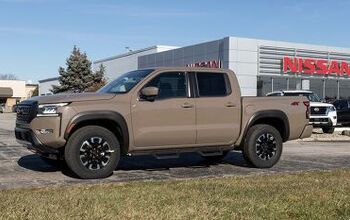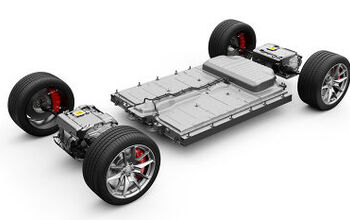U.S. Auto Sales Continue to Decline, July Outlook Dim

We’re now in the seventh month of declining automotive sales in the United States. However, global sales haven’t fared any better. China posted its worst-ever monthly decline more than once this year with specific brands claiming as much as 70-percent slump in sales through the first half of 2019. Things are also going badly in Europe and have been for quite some time, with June playing host to some exceedingly bad metrics.
In fact, North America has had it comparatively good since its troubles hadn’t become truly persistent until the start of this year and the monthly dip rate has been been less severe. That does not, however, make the situation in the U.S. sunshine and roses.
Automotive News rounded up the usual suspects to see what the sales forecast looks like and the prognosis could be better. TrueCar/ALG and J.D. Power/LMC predicted light-vehicle deliveries would decline 2.9 percent and 1.8 percent, respectively. Cox Automotive and Edmunds had a cheerier outlook, proposing slight gains averaging around 0.5 percent vs this time last year.
Considering how poorly the industry seems to be doing as a whole, we’re not quite as optimistic. But nobody has a crystal ball and there are both good and bad examples to draw from. While Nissan is the poster child for a bleak outlook, Hyundai had a strong June with sales creeping up by 6.2 percent. In fact, most outlets presumed Hyundai would continue performing well throughout 2019 while Nissan begins its recovery efforts.
We’ll have some clarification when most automakers post their July sales results on Thursday. But premonitions for July are largely mixed, with a touch of melancholy.
From Automotive News:
Edmunds forecasts declines for all but two automakers: General Motors, which it says will post a 5.6 percent gain, and Hyundai/Kia, which it says will have a 9.9 percent gain.
Cox is more optimistic, predicting sales increases at GM (3 percent), Nissan (1.1 percent), Hyundai/Kia (4.9 percent), Volkswagen (2.3 percent) and Subaru (2.6 percent). If the prediction comes true, it would be Subaru’s 92nd consecutive monthly gain.
ALG, which splits Hyundai and Kia, forecasts gains for BMW (up 0.6 percent), Daimler (1.7 percent), Hyundai (6.2 percent) and Kia (3.4 percent). It also forecasts a 67.5 percent gain for Tesla, although other forecasters do not include the electric-vehicle maker in their estimates.
Incentive spending is also looking to be all over the place, with some brands looking to abandon them to stabilized profits while others dump them atop high-margin vehicles to whet consumer appetites.
“Despite buoyant market fundamentals, auto sales are being pulled back by lower incentives,” said Oliver Strauss, Chief Economist for ALG. “SAAR (seasonally adjusted annual rate) however has fluctuated in 2019 more than in previous years, pointing to some uncertainty about the remainder of the year.”
While decreasing incentive spending is likely a wise move for overstretched manufacturers, affordability has become a deciding factor in terms of overall sales — even though the demand to buy is there.
“Strong consumer confidence and employment gains are supporting stable demand for light vehicles,” said Charlie Chesbrough, senior economist, Cox Automotive. “However, affordability issues continue to weigh on the market. The estimated average transaction price for a new light vehicle in the U.S. is $37,285 in the most recent Kelley Blue Book report, and we do not see this number coming down.”
For the sake of comparison, the average transaction price for a car in 1980 would be somewhere in the neighborhood of $22,000 after being adjusted for inflation. While the U.S. Bureau of Economic Analysis cites the cost the typical modern-day car as decidedly lower, the math still works out to today’s vehicles costing consumers more overall.
Even if things do improve in July, most agree it’ll be down to the month having an extra day in it this year and warned not to automatically assume it means a national turnaround — not that you really need to bother getting your hopes up. “A lot of people are enjoying vacations and family time in July, so it’s generally not a strong month for auto sales. The fact that automakers could eke out a slight gain is encouraging but not necessarily indicative of a positive trend,” said Jeremy Acevedo, Edmunds’ senior manager for insights. “The extra selling day makes things look a little better than they really are, and we still believe sales will continue to trend downward through the back half of the year.”
[Image: Bell Ka Pang/Shutterstock]

A staunch consumer advocate tracking industry trends and regulation. Before joining TTAC, Matt spent a decade working for marketing and research firms based in NYC. Clients included several of the world’s largest automakers, global tire brands, and aftermarket part suppliers. Dissatisfied with the corporate world and resentful of having to wear suits everyday, he pivoted to writing about cars. Since then, that man has become an ardent supporter of the right-to-repair movement, been interviewed on the auto industry by national radio broadcasts, driven more rental cars than anyone ever should, participated in amateur rallying events, and received the requisite minimum training as sanctioned by the SCCA. Handy with a wrench, Matt grew up surrounded by Detroit auto workers and managed to get a pizza delivery job before he was legally eligible. He later found himself driving box trucks through Manhattan, guaranteeing future sympathy for actual truckers. He continues to conduct research pertaining to the automotive sector as an independent contractor and has since moved back to his native Michigan, closer to where the cars are born. A contrarian, Matt claims to prefer understeer — stating that front and all-wheel drive vehicles cater best to his driving style.
More by Matt Posky
Latest Car Reviews
Read moreLatest Product Reviews
Read moreRecent Comments
- Redapple2 jeffbut they dont want to ... their pick up is 4th behind ford/ram, Toyota. GM has the Best engineers in the world. More truck profit than the other 3. Silverado + Sierra+ Tahoe + Yukon sales = 2x ford total @ $15,000 profit per. Tons o $ to invest in the BEST truck. No. They make crap. Garbage. Evil gm Vampire
- Rishabh Ive actually seen the one unit you mentioned, driving around in gurugram once. And thats why i got curious to know more about how many they sold. Seems like i saw the only one!
- Amy I owned this exact car from 16 until 19 (1990 to 1993) I miss this car immensely and am on the search to own it again, although it looks like my search may be in vane. It was affectionatly dubbed, " The Dragon Wagon," and hauled many a teenager around the city of Charlotte, NC. For me, it was dependable and trustworthy. I was able to do much of the maintenance myself until I was struck by lightning and a month later the battery exploded. My parents did have the entire electrical system redone and he was back to new. I hope to find one in the near future and make it my every day driver. I'm a dreamer.
- Jeff Overall I prefer the 59 GM cars to the 58s because of less chrome but I have a new appreciation of the 58 Cadillac Eldorados after reading this series. I use to not like the 58 Eldorados but I now don't mind them. Overall I prefer the 55-57s GMs over most of the 58-60s GMs. For the most part I like the 61 GMs. Chryslers I like the 57 and 58s. Fords I liked the 55 thru 57s but the 58s and 59s not as much with the exception of Mercury which I for the most part like all those. As the 60s progressed the tail fins started to go away and the amount of chrome was reduced. More understated.
- Theflyersfan Nissan could have the best auto lineup of any carmaker (they don't), but until they improve one major issue, the best cars out there won't matter. That is the dealership experience. Year after year in multiple customer service surveys from groups like JD Power and CR, Nissan frequency scrapes the bottom. Personally, I really like the never seen new Z, but after having several truly awful Nissan dealer experiences, my shadow will never darken a Nissan showroom. I'm painting with broad strokes here, but maybe it is so ingrained in their culture to try to take advantage of people who might not be savvy enough in the buying experience that they by default treat everyone like idiots and saps. All of this has to be frustrating to Nissan HQ as they are improving their lineup but their dealers drag them down.


































Comments
Join the conversation
@Felix Hoenikker--You were lucky. In Ohio the insurance company would have totaled your car. Recently on one of the TV stations in Cincinnati a guy who had a 2002 Impala with less the 100k miles had his car damaged in a parking lot damaging a rear door but the car was still driveable with no other damage. The other persons insurance paid him for the totalled vehicle after they would not pay him for any damages and said if he kept the vehicle Ohio would reissue a new title as a salvaged car which would basically make his car an insurance risk.
I read "One World, Ready or Not" in the 1990s and Greider talked a lot about massive global overcapacity in autos. Here we are in 2019 and the situation is the same. A couple of brands that totaled about as much as a rounding error in sales have been killed off, that's it. Still too many units chasing too few buyers. So automakers like Ford and GM are chasing higher margins: killing low-profit cars, cutting back fleet sales, building high-profit CUVs. But after 35+ years of wages not increasing in lockstep with productivity as they used to, people don't have the dough for a new car, especially if one is a good chunk more expensive than it used to be. Lucky for them, cars don't suck nearly as much as they once did, and a used one will last them as long as a new one used to, but still: fewer new-car sales. The business cycle still exists, and we're due for a recession. The tax cut aimed at fat-cats might have staved things off for a little bit, but it's a fake boom: the percentage bump in growth matches almost dollar for dollar with the cost; that is, it's not working out like an investment, it's just working out like taking a cash advance on your credit card and depositing it in your checking account, only your kids have to pay the card. Supply-side stimulus just doesn't work very well, especially in times of political uncertainty, like we have now with tariffs and nationalism threatening free trade across the globe. So...sooner or later, that recession is coming. And since our dear leaders used the tools of stimulative tax cuts and (arguably) Fed rate cuts irresponsibly to get a political boost during an already-strong economy, those tools won't be be available to help us alleviate the pain much during a weak economy. So as my friend used to say..."buckle up, chuckleheads, it's gonna get worse." Unless it doesn't. Who the hell knows anymore. Markets and political systems seem really bad at following the models lately.